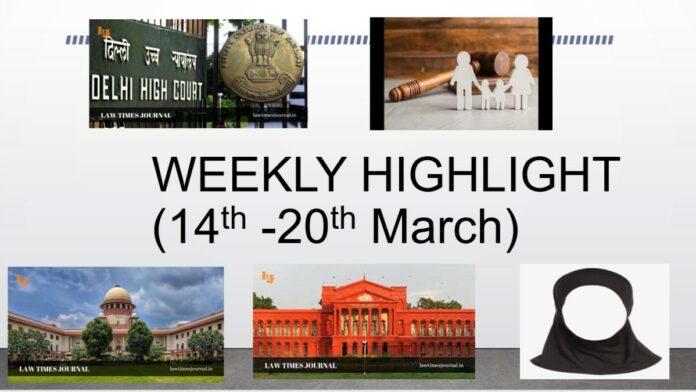
SC ruled that inability to pay rent is not a penal offence under IPC,1860
The Supreme Court was hearing an appeal against an Allahabad High Court order in a case where an FIR had been filed against a tenant under Sections 403 (dishonest appropriation of property) and 415 (cheating). After the Allahabad High Court refused to dismiss the FIR against the tenant, the case was appealed to the Supreme Court. The Supreme Court stated that the dispute over pending rent arrears and the vacating of the premises will be resolved through civil proceedings. Non-payment of rent may result in civil consequences, but it is not a criminal offence under the Indian Penal Code.
Minors welfare should be given preference in case of conflict between Personal Law And Minor’s Welfare: Chhattisgarh HC
The Chhattisgarh High Court recently ruled that the minor’s welfare should prevail over personal law. When deciding custody battles, the Bench emphasised the importance of a “human touch” in addition to statutory obligations. In the instant case, the couple made several allegations against each other, and the appellant-father relied heavily on the parties’ settlement agreement, which granted him custody of the children. The respondent, on the other hand, claimed that the appellant committed fraud in order to carry out the settlement.
Case Name: Irfan Ur Rahim Khan V Farha Khan
Daughter not entitled to any amount if she’s unwilling to maintain a relationship with her father: SC
A division bench of Justices Sanjay Kishan Kaul and MM Sundresh held that the daughter (20 years old) who does not want to maintain any relationship with her father, cannot demand money from him for education. In the instant case the husband was seeking restitution of conjugal rights, later he filed a plea for dissolution of marriage. The plea was challenged by the wife in the Punjab and Haryana, High court. Before the present appeal in the supreme court, reconciliation efforts failed to take place through mediation. The daughter was living with her mother since birth, had no contact with her father for two decades. The reconciliation efforts between father and daughter had also failed.
Caste and Income certificate can’t be treated alike: Karnataka HC
The Karnataka High Court’s Dharwad Bench has reiterated that a caste certificate is not the same as an income certificate and cannot be treated as such. A Division Bench of Justices SG Pandit and Anant Ramanath Hegde stated that it is settled law that eligibility in all aspects of a recruitment process must be determined as of the last date for submitting applications. As a result, the Court overturned a State Administrative Tribunal order directing the Karnataka High School Examination Board to consider an application for a teacher’s post despite the applicant’s failure to submit a valid creamy-layer certificate within the prescribed time limit.
66-year-old women files petition in SC against Karnataka HC Hijab Ban Judgement
A petition has been filed in the Supreme Court challenging the Karnataka High Court’s Hijab judgement, which held that hijab is not an essential religious practise (ERP) of Islam and thus upheld the power granted to colleges to prohibit the wearing of hijab on college campuses. The plea was filed by Sajeeda Begum, who had previously filed an impleadment application with the High Court. Begum claimed that, despite pressing the application and urging the High Court to hear the applicants-intervenors, the High Court did not implead them and did not allow them to argue their arguments and submissions, thus violating the “principle of orality.”





